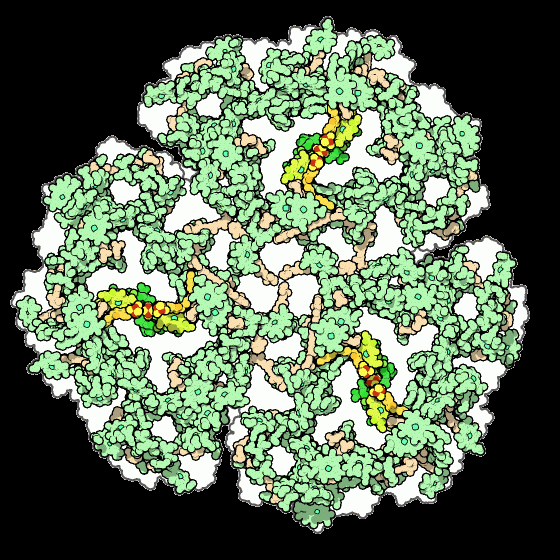I cant belive my man thinks rasing intrest rates will do anything to combat wages going up due..... too...
- 1 million dead Americans due to rona( and counting)
- Rising class conscious due to how rona was handled
- 54 million boomer Americans are gonna be dead in less then a decade due to age
- Stagnate casino econmy predicated on cheap labor + imperialism × decaying gentocracy
Whats the plan Man? How you gonna fix this shit once it crashes, how many times is he gonna quatativly ease him self when inflation is rampant and not gonna respond to increassd intrest rates. Go Volcker suck on these these nuts
Go crazy tell me where you think the ecomy is going
You left out the 25+ million people who were disabled by long covid. That's the real kicker imo
This tbh. Everyone always forgets about this. I've got two acquaintances that use inhalers now because of COVID.
I mean, the man has more or less been tasked with an impossible task. He somehow has to combat inflation by lowering wages and fix supply issues that are partly caused by the dumbass sanctions made up by the State department ghouls. There is a pretty good chance that he already knows all these factors, but finds it impossible to get out without causing the entire house of cards to collapse. And since stooges for capital are concerned primarily with their own wealth and power, he doesn't want to spook the fragile economy.
and Powell is not only a stooge, but literally a former investment banker with tens* of millions of $
Published by the Federal Reserve in May 2022 (although the paper itself is dated September 2021):
Who Killed the Phillips Curve? A Murder Mystery
https://doi.org/10.17016/FEDS.2022.028
Abstract:
Is the Phillips curve dead? If so, who killed it? Conventional wisdom has it that the sound monetary policy since the 1980s not only conquered the Great Inflation, but also buried the Phillips curve itself. This paper provides an alternative explanation: labor market policies that have eroded worker bargaining power might have been the source of the demise of the Phillips curve. We develop what we call the "Kaleckian Phillips curve", the slope of which is determined by the bargaining power of trade unions. We show that a nearly 90 percent reduction in inflation volatility is possible even without any changes in monetary policy when the economy transitions from equal shares of power between workers and firms to a new balance in which firms dominate. In addition, we show that the decline of trade union power reduces the share of monopoly rents appropriated by workers, and thus helps explain the secular decline of labor share, and the rise of profit share. We provide time series and cross sectional evidence.
The Kalecki of their "Kaleckian Phillips curve" is Michał Kalecki, who was a 20th century economist considered part of the Neo-Marxian school of economics.
Excerpt from a press conference Jerome Powell did on 4 May 2022 after the Federal Reserve's monetary policy meeting that day:
Q: Your level of confidence that you can slow hiring without pushing the economy into a downturn.
MR. POWELL: So I guess I would say it this way. It’s—there’s a path. There’s a path by which we would be able to have demand moderate in the labor market and have—therefore have vacancies come down without unemployment going up, because vacancies are at such an extraordinarily high level. There are 1.9 vacancies for every unemployed person; 11½ million vacancies, 6 million unemployed people. So—and we haven’t been in that place on the vacancy—you know, through the vacancy/unemployed curve, the Beveridge curve. We haven’t been at that sort of level of a ratio in the modern era.
So in principle, it seems as though, by moderating demand, we could see vacancies come down, and as a result—and they could come down fairly significantly and I think put supply and demand at least closer together than they are, and that that would give us a chance to have lower—to get inflation—to get wages down and then get inflation down without having to slow the economy and have a recession and have unemployment rise materially. So there’s a path to that.
Now, I would say I think we have a good chance to have a soft or softish landing, or outcome, if you will. And I’ll give you a couple of reasons for that. One is, households and businesses are in very strong financial shape. You’re looking at, you know, excess savings on balance sheets; excess in the sense that they’re substantially larger than the prior trend. Businesses are in good financial shape. The labor market is, as I mentioned, very, very strong. And so it doesn’t seem to be anywhere close to a downturn.
Therefore, the economy is strong and is well positioned to handle tighter monetary policy. So—but I’ll say I do expect that this will be very challenging. It’s not going to be easy. And it may well depend, of course, on events that are not under our control. But our job is to use our tools to try to achieve that outcome, and that’s what we’re going to do.
Source: https://www.wsj.com/articles/transcript-fed-chief-powells-postmeeting-press-conference-11651696613
And he's echoed this more recently as well:
(CNN) - Federal Reserve Chairman Jerome Powell told lawmakers on Thursday [23 June 2022] that aggressive interest rate hikes designed to tame inflation could lift unemployment on Main Street.
Powell said that although it's "certainly possible" to get inflation under control without causing job losses, that may not be the case.
"There is a risk that unemployment will move up, from what is an historically low level though," Powell said during a hearing before the House Financial Services Committee.
Powell said the Fed's interest rate increases are "designed to drive growth down to a level that is more sustainable and give the supply side a chance to catch up."
However, he conceded that the Fed does not have "precision tools" and job losses could be in the cards.
The unemployment rate stood at just 3.6% in May, down from nearly 15% in April 2020. Last week, Fed officials projected the unemployment rate will rise to 3.9% at the end of 2023 and 4.1% at the end of 2024.
Powell said that unemployment above 4% would "still be very strong."
The Fed chair noted that today there are two vacancies for every unemployed person. "That's a labor market that's kind of overheating," he said.
Source: https://edition.cnn.com/2022/06/23/economy/fed-jerome-powell-house-testimony
So Powell's trying to walk a tightrope using the tools the Federal Reserve has: he is trying to in effect discipline labor by using interest rates to loosen the job market, but he's hoping to do it without dipping the economy into a recession.
He's established that he's very much aware of how there's risk in his strategy. He isn't making guarantees about avoiding a recession.
we show that the decline of trade union power reduces the share of monopoly rents appropriated by workers, and thus helps explain the secular decline of labor share, and the rise of profit share
share of monopoly rents appropriated by workers
dismal science indeed
During rona the Fed also loaded itself up with billions of corporate bonds, they only did that a little in 2008 but they really were buying in 2020. If those are still on the books the fed could be in a real tough spot during a recession.
It's going to make inflation worse because the rising cost of borrowing money will make it harder to increase output and invest in the supply chain. Also monopolies will be protected from startups that will have a harder time accessing capital.
The rising cost of borrowing money would also make investors more likely to invest safer things like factories and less in riskier fake Silicon Valley startups right? Uber is able to operate unprofitably because of the long run of low interest rates
Powell, I thought the economy fixed itself though. What kind of neoliberal are you?
its crazy that his choice of adjectives and verbs can easily fluctuate the markets by +-5%
I don't understand why so many communists on this site think it's more leftist to keep giving banks free money than raise rates so they start paying for money :ritzy-marx:
Probably the thing to do is to raise interest rates by more than what the market expects. The fed only looks backwards. While they're looking at last month's interest rates, firms are already writing the future's contracts. When businesses believe the fed is going to hesitate (because of their pattern of behavior) to act on already post-dated information, they raise prices to account for the distance the fed lags, which gets larger and larger.
That pattern of behavior was when the fed diverged from a credible 2% inflation target policy to a policy of flying by the seat of their pants at which they did not have any credibility.
People here are going to disagree with me but at least we have unemployment insurance. We experience inflation uninsulated, workers and nonworkers alike. You get stuck in your car note. When you get laid off you're not legally obligated to stay unemployed.
all because of a handful of nerds at the fed board.
maybe because higher interest rates and a shitfucked economy disproportionately hurts working class people since a shitfuck economy involves layoffs?
to say nothing of how higher interest rates result in the debt of the working class accelerating and compounding even faster
and inflation doesn't?
I don't really want to argue about which hurts the people more (it's 8% inflation btw) but if raising rates causes job loss (which I think we know it's a pretty tenuous correlation anyway) that doesn't mean it's not still a net benefit to people. Inflation also effects living indoors and feeding yourself. There's a point where raising rates crosses from net good to net harm and I'm pretty sure that point is not a 0.75% hike after a decade of 0%
neither is particularly great. inflation without wage increases is horrible, but it will also continue to ramp up to varying extents as america declines regardless of what the interest rates are.
lower interest rates = lower speed of compounding debt, which tends to affect all of us. increasing interest rates almost always leads to higher unemployment and in america, that means more death and social murder as people fall into economic collapse.
ok well the hike is a month old so I guess we'll see. It certainly isn't a 1:1 correlation. I'm saying there's at least enough slack that you can start to nudge up after a decade near zero wouldn't you agree?
Not to sound dismissive but a recession phase of higher unemployment isn't the end of the world or else the world has ended 30 times now. Meanwhile we haven't experienced an inflationary period since like Carter or whatever. Did you hear JP said like "we're finally understanding how little we understand about inflation"? JP could be a hexbear for all the underestimating he does on inflation 😘
Not to sound dismissive but a recession phase of higher unemployment isn’t the end of the world or else the world has ended 30 times now
that is pretty callous for the many people who become unemployed and can’t pay their bills. one of the things I dislike about economics nerds is the removal of the human factor
ultimately we’ll see either way. I hope the minimum amount of people are harmed regardless :shrug-outta-hecks:
well it's like 'don't ever raise interest rates because it might cause a recession'. When has there ever NOT been another recession? That's what this ride does.
You have it backwards, banks get free money with high interest rates.
The raised interest rate is a smoke screen for the real objective which is to control inflation by creating unemployment and taking money away from the unemployed and giving it to the rich who will hoard it. In essence, cutting the use of resources by making the most vulnerable take the L instead of rationing on a needs basis.
Capitalism is a class system. That’s what he’s doing. Trying to disrupt what’s going on in labor market. All they need to do is print money again and we’re back to 2021. Only thing is this will devalue the dollar. Everything is based on the US being the worlds reserve economy. Eventually some other currency will displace the dollar. This will speed it up.
Im unsure printing more money will be able to rewind the clock on this, they fixed 2008 by flooding the market with money and so forth. Imagine Powell falls off this tight rope casues a recession without fixing the inflation which is very possible at this point. I cant see them dumping more cash into a already inflated econmy. I belive once this all comes crashing down they will decide to do war to stabilize this mess. Which again we will lose we havent fought a real nuclear power military since ww2





